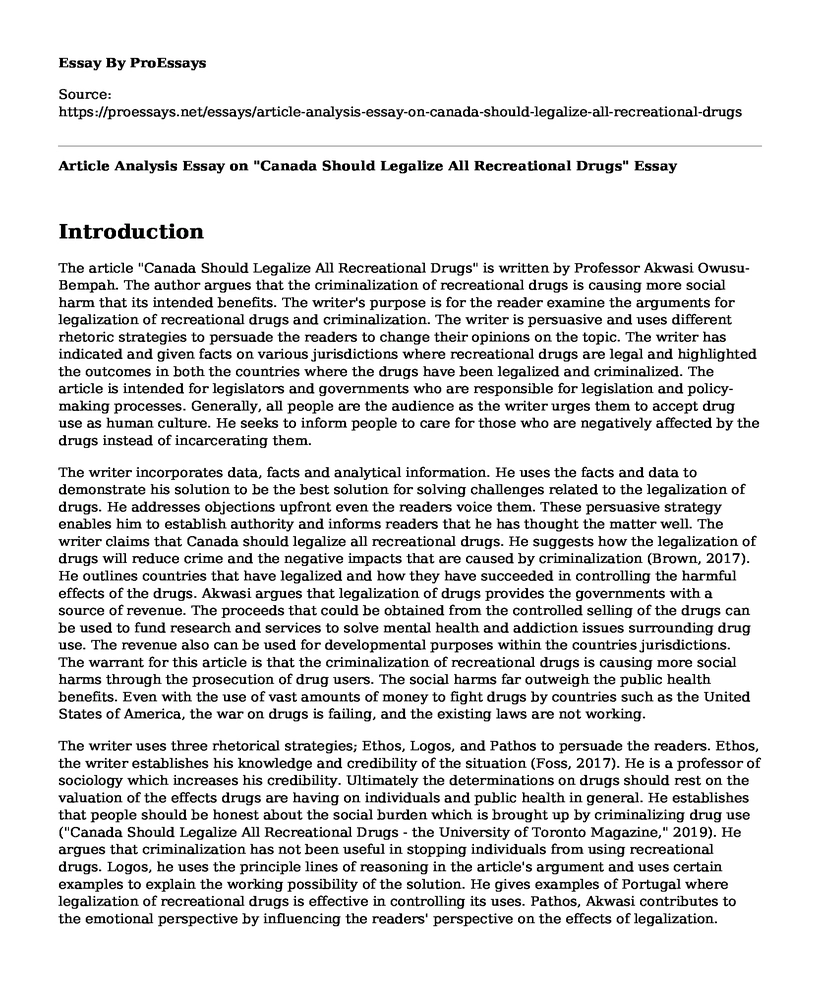Introduction
The article "Canada Should Legalize All Recreational Drugs" is written by Professor Akwasi Owusu-Bempah. The author argues that the criminalization of recreational drugs is causing more social harm that its intended benefits. The writer's purpose is for the reader examine the arguments for legalization of recreational drugs and criminalization. The writer is persuasive and uses different rhetoric strategies to persuade the readers to change their opinions on the topic. The writer has indicated and given facts on various jurisdictions where recreational drugs are legal and highlighted the outcomes in both the countries where the drugs have been legalized and criminalized. The article is intended for legislators and governments who are responsible for legislation and policy-making processes. Generally, all people are the audience as the writer urges them to accept drug use as human culture. He seeks to inform people to care for those who are negatively affected by the drugs instead of incarcerating them.
The writer incorporates data, facts and analytical information. He uses the facts and data to demonstrate his solution to be the best solution for solving challenges related to the legalization of drugs. He addresses objections upfront even the readers voice them. These persuasive strategy enables him to establish authority and informs readers that he has thought the matter well. The writer claims that Canada should legalize all recreational drugs. He suggests how the legalization of drugs will reduce crime and the negative impacts that are caused by criminalization (Brown, 2017). He outlines countries that have legalized and how they have succeeded in controlling the harmful effects of the drugs. Akwasi argues that legalization of drugs provides the governments with a source of revenue. The proceeds that could be obtained from the controlled selling of the drugs can be used to fund research and services to solve mental health and addiction issues surrounding drug use. The revenue also can be used for developmental purposes within the countries jurisdictions. The warrant for this article is that the criminalization of recreational drugs is causing more social harms through the prosecution of drug users. The social harms far outweigh the public health benefits. Even with the use of vast amounts of money to fight drugs by countries such as the United States of America, the war on drugs is failing, and the existing laws are not working.
The writer uses three rhetorical strategies; Ethos, Logos, and Pathos to persuade the readers. Ethos, the writer establishes his knowledge and credibility of the situation (Foss, 2017). He is a professor of sociology which increases his credibility. Ultimately the determinations on drugs should rest on the valuation of the effects drugs are having on individuals and public health in general. He establishes that people should be honest about the social burden which is brought up by criminalizing drug use ("Canada Should Legalize All Recreational Drugs - the University of Toronto Magazine," 2019). He argues that criminalization has not been useful in stopping individuals from using recreational drugs. Logos, he uses the principle lines of reasoning in the article's argument and uses certain examples to explain the working possibility of the solution. He gives examples of Portugal where legalization of recreational drugs is effective in controlling its uses. Pathos, Akwasi contributes to the emotional perspective by influencing the readers' perspective on the effects of legalization.
The proposal to legalize recreational drugs has received public attention. There have been proponents who have made arguments for legalization of recreational drugs. The legalization of recreational drugs will earn states revenues. Regulation and control of drugs would lead to a decrease in drugs in Canada. The reduction of crimes that are drug-related could result in less incarceration of drug users.
Reference
Brown, R. H. (2017). Poetics, politics, and truth: An invitation to rhetorical analysis. In Writing the Social Text (pp. 3-8). Routledge.
Canada Should Legalize All Recreational Drugs - University of Toronto Magazine. (2019). Retrieved from https://magazine.utoronto.ca/opinion/canada-should-legalize-all-recreational-drugs-awkasi-owusu-bempah/
Foss, S. K. (2017). Rhetorical criticism: Exploration and practice. Waveland Press.
Cite this page
Article Analysis Essay on "Canada Should Legalize All Recreational Drugs". (2022, Nov 14). Retrieved from https://proessays.net/essays/article-analysis-essay-on-canada-should-legalize-all-recreational-drugs
If you are the original author of this essay and no longer wish to have it published on the ProEssays website, please click below to request its removal:
- Essay Example on Racial Discrimination and Other Sociological Issues in America
- Violence in Downtown Los Angeles Essay
- Race the Power of an Illusion Essay Example
- Project Discussion on Federal Income Taxation Paper Example
- The Fight for Women's Rights Essay Example
- Essay Example on Globalization Brings Cumulative Crisis in African Nations: A Study
- Essay Example on Educational Achievement Gap: African Americans vs. Caucasians







